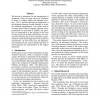Free Online Productivity Tools
i2Speak
i2Symbol
i2OCR
iTex2Img
iWeb2Print
iWeb2Shot
i2Type
iPdf2Split
iPdf2Merge
i2Bopomofo
i2Arabic
i2Style
i2Image
i2PDF
iLatex2Rtf
Sci2ools
117
click to vote
COLING
2002
2002
Towards a Noise-Tolerant, Representation-Independent Mechanism for Argument Interpretation
We describe a mechanism for the interpretation of arguments, which can cope with noisy conditions in terms of wording, beliefs and argument structure. This is achieved through the application of the Minimum Message Length Principle to evaluate candidate interpretations. Our system receives as input a quasi-Natural Language argument, where propositions are presented in English, and generates an interpretation of the argument in the form of a Bayesian network (BN). Performance was evaluated by distorting the system's arguments (generated from a BN) and feeding them to the system for interpretation. In 75% of the cases, the interpretations produced by the system matched precisely or almost-precisely the representation of the original arguments.
COLING 2002 | COLING 2008 | Minimum Message Length | Noisy Conditions | Quasi-natural Language Argument |
| Added | 17 Dec 2010 |
| Updated | 17 Dec 2010 |
| Type | Journal |
| Year | 2002 |
| Where | COLING |
| Authors | Ingrid Zukerman, Sarah George |
Comments (0)

